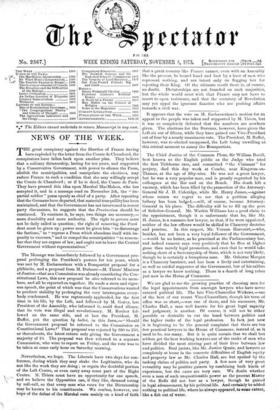We are glad to see the growing practice of choosing
men for the legal appointments from amongst lawyers who have never entered political life. The late Vice-Chancellor Wickens,—one of the best of our recent Vice-Chancellors, though his term of office was so short,—was one of these, and his successor, Mr. Charles Hall, a man well known for his great legal sagacity and judgment, is another. Of course, it will not be either possible or desirable to cut the bond between politics and the higher ranks of the legal profession. In fact, just now it is beginning to be the general complaint that there are too few practical lawyers in the House of- Commons, instead of, as it used to be, too many. But it is quite certain that we shall but seldom get the best working lawyers out of the ranks of men who have divided the most stirring part of their lives between law and politics. Real jurists, like Mr. Justice Quain, and lawyers as completely at home in the concrete difficulties of English equity and property law as Mr. Charles Hall, are but spoiled by the tasking claims of politics and party. A few men of very great versatility may be positive gainers by combining both kinds of experience, but the cases are very rare. We doubt whether even a man of such unquestionable power as the present Master of the Rolls did not lose as a lawyer, though he gained in legal advancement, by his political life, And certainly he added nothing to political life, where he always appeared, to some extent, like a fish out of water.


































